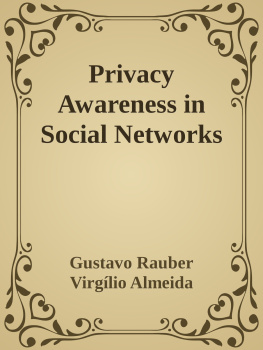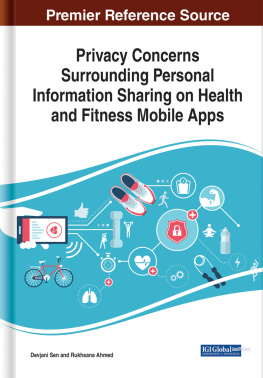GUSTAVO COSTA RAUBER PRIVACY AWARENESS IN SOCIAL NETWORKS This work is dedicated to Professor Christiano Gonalves Becker (in memoriam). iii You must be the change you want to see in the world. (Mahatma Gandhi) v Abstract Online social networks such as Facebook, Twitter and LinkedIn have experienced ex ponential growth in recent years. Users are spending more time on Online Social Networking (OSN) sites than on any other sites and services on the Internet. Users post and share a lot of personal information on these sites without being aware of their privacy implications. Personal information posted on these OSNs can be a treasure for marketing companies and cyber criminals.
Characterizing the privacy awareness of users is important to design technologies and policy solutions. Users expect the OSN site to provide good privacy protection or provide controls so they can make informed decisions about their privacy. This dissertation investigates the privacy awareness of users on Facebook, the largest OSN. The present study is one of the first to character ize the privacy awareness on OSN through a real world experiment, not self-reported data. The main findings are: only a low percentage of users change the default privacy settings; most users expose their gender and friends list publicly; most users who have commended their location information to Facebook expose it publicly; users exercise more control over content with more potential to endanger their reputation; people tagged by an individual form strong-tie egocentric networks; an important share of users expose their full date of birth to their network; the aggregation of individual bits can reveal once private information. vii Contents Abstract Introduction Background 2.1 Privacy Concept and the Right to Privacy................ 2.2 Privacy on Facebook............................ 2.3 Privacy Studies in Brazil and India.................... 2.4 Facebook Photos.............................. 2.5 OSN Growth in Brazil and India ..................... 2.5 OSN Growth in Brazil and India .....................
Methodology 3.1 Recruitment................................. 3.2 Study Setup................................. 3.3 Data Set and Demographics........................ Hypotheses 4.1 H1: Default Privacy Settings........................ 4.2 H2: Gender Exposure............................ 4.4 H4: Content Exposure........................... 4.5 H5: Friends List Exposure......................... 4.6 H6: Date of Birth Exposure........................ 4.6 H6: Date of Birth Exposure........................
Results 5.1 H1: Default Privacy Settings........................ 5.2 H2: Gender Exposure............................ 5.3 H3: Location Exposure........................... 5.4 H4: Content Exposure........................... ix 5.5 H5: Friends List Exposure......................... 5.7 Further Analyses.............................. 5.7.1 Egocentric Networks........................ 5.7.2 Aggregation Erodes Privacy.................... 5.7.2 Aggregation Erodes Privacy....................
Conclusion Bibliography x Chapter 1 Introduction Popular destinations on the Web such as search engines, news media, social network ing, video or photo sharing and online games attract hundreds of millions of users every day, where they interact with different kinds of services. On one hand, these interactions yield valuable data that can be used to personalize the users web experi ence. On the other hand, these interactions always leave data crumbs that can be used to breach users privacy. Also, these destinations can share sensitive or personal user information with other users or third parties without proper user consent. Search en gines can consciously or inadvertently also build user profiles, store user IP addresses, or collect any other information that could ever tie a particular search to a specific user Social networking sites offer attractive means of online social interactions and communications, but also raise privacy and security concerns. Facebook is the number one network in the world, except for a few countries, like Japan and China Facebook has more than 800 million active users at any given point in time and 30 billion pieces of content (hyperlinks, notes, photos, etc.) are shared by its users each month.
Facebook supports more than 70 languages, what makes it a huge global digital space. Like the Web itself, Facebook is a powerful technology to increase connection between people separated by borders of nation, lan guage, religion and culture. With an estimated 65 billion friendships, it is important to study how this crucial technology is perceived across different cultures and understand users privacy awareness Facebook has also been revising its privacy policy and settings from the day of inception, what directly affects a large population in the world. The focus of this research is to study Facebook users privacy awareness / carelessness around the globe, and in particular, Chapter 1. Introduction in Brazil and India. To the best knowledge of the author, this is the first study to analyze and com pare the privacy awareness of Facebook users in Brazil and India through a real world experiment.
It has used real-world data (not self reported) for studying privacy pref erences. Understanding users behavior in real world settings is critical to develop any technological or policy solutions The findings from this dissertation can be useful for other Online Social Networks and not just Facebook. The main contributions of this dissertation are: Investigate privacy awareness of Facebook users using real world data. Show that the majority of the users are oblivious to privacy and reveal a lot of personal information on Facebook. Show that users from two different countries have different perceptions about the desired levels of privacy. Compare commended information to Facebook with what is made publicly avail able.
This dissertation is organized as follows. Chapter 2 introduces a notion about privacy and the idea of the right to privacy. It also portrays a great number of studies that were conducted about privacy related to the usage of Facebook and other Online Social Networks and many other related works. The growth of Online Social Network ing experienced in Brazil and India is also a topic of discussion. Chapter 3 focuses on the study methodology, the application which was developed and the data sets that were acquired. Chapter 4 presents some hypotheses about how users perceive or ignore privacy on Facebook.
Chapter 5 reports the results that support the hypotheses made and a couple further analyses. Chapter 6 discusses the results found, presents some conclusions and future work directions. Chapter 2 Background In this chapter is presented a brief background on various studies (in particular, privacy) that have been done on Facebook. It also describes some results from studies which have analyzed cultural aspects of privacy to provide a background on the comparison that is aftwerwards made between users from Brazil and India. 2.1 Privacy Concept and the Right to Privacy The concept of privacy is not something new. A panoply of definitions can be found and consent might be hard to achieve although everyone has a certain understanding of its concept.
The New Oxford American Dictionary defines privacy as: 1) the state or condition of being free from being observed or disturbed by other people; 2) the state of being free from public attention - a law to restrict newspapers freedom to invade peoples privacy. One of the first signs of the privacy principle on contemporary law appears on the fourth amendment of the United States Constitution, which states: The right of the people to be secure in their persons, houses, papers, and effects, against unreasonable searches and seizures, shall not be violated, and no warrants shall issue, but upon probable cause, supported by oath or affirmation, and particularly describing the place to be searched, and the persons or things to be seized. Chapter 2. Background developed the right to privacy concept based upon the right to be let alone, an expression coined a couple years earlier by Judge Thomas Cooley. They were responsible for important developments of peoples privacy law and their Harvard Law Review article still seems fresh. Nowadays, argues that the fourth amendment should be abandoned as a test of privacy invasion in exchange for a more pragmatic approach to face the issue of government information gathering.
Next page






